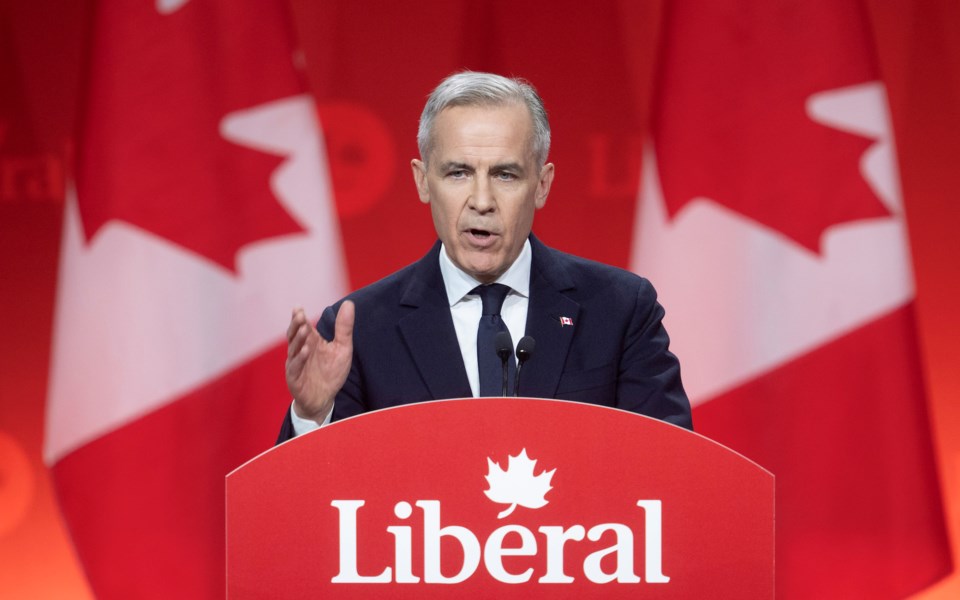Editor's note: This article originally appeared on Parliament Today, a Village Media newsletter devoted exclusively to covering federal politics.
Liberal Leader Mark Carney plugged what he described as an "ambitious but attainable” path towards making Canada an "energy superpower,” recommitting to the Impact Assessment Act but vowing to use it differently than his predecessor.
Carney made the announcement at a campaign stop in Calgary, calling for a shift in “mindset” to get major projects off the ground quicker by bringing in a “single window” of approval.
“At the moment, when we’re thinking about new projects, too often the immediate question is ‘Why?’ Instead, we need to ask ourselves ‘How, how do we get it done?’” he said.
Carney promised to establish a major federal project office aimed at issuing a decision on projects of national importance after a “single review” within two years instead of five, vowing it will not compromise environmental standards or Canada’s "constitutional and moral obligation to Indigenous people.”
Carney said that he reached a deal with Canada’s premiers on curbing duplicative assessments and other bureaucracy before the election was called. He also reiterated that, if elected, he would not repeal former Bill C-69, legislation that in part established the Impact Assessment Act to assess major projects like pipelines and mines, which the CPC has blamed for holding up energy projects.
“Within six months of being elected, a new Liberal government will utilize the Impact Assessment Act to sign agreements with all willing premiers and Indigenous governments — agreements that will recognize provincial, territorial and Indigenous-led project assessments — substituting the process to review major projects to them.”
Carney touted previously announced measures while admitting his push will come with a cost, though he argued it’s acceptable for Ottawa to “run a prudent capital deficit” to spur private investment in these projects while balancing its operational budget.
The Liberal captain has spent much of his campaign promising to speed up permitting for clean and “conventional” energy projects, adding Wednesday that Canada must take its "rightful place” in a 21st-century economy powered by renewables and “only the cleanest oil and gas.” But he dismissed suggestions that he’s compromising his green bona fides now that he’s seeking elected office.
“We want to dominate the market for conventional energy, and in order to do that in the long term, it needs to be lower carbon,” he said, vowing to do that with a “focus on making it as clean as possible.”
Carney argued the oil and gas sector acknowledges the need to curb emissions, noting the industry has agreed to hit net-zero emissions by 2050 — a timeline that gets closer every day.
“The time for analysis of how to get there is ending. My government is focused on results, and the result of the current consultations on the emissions cap will reflect the importance of efficiently and fairly achieving these objectives.”
Draft rules for the controversial tool, which Alberta Premier Danielle Smith has warned sets unrealistic targets, were published last fall. The goal was for the final rules to be shared this spring, though that was before former prime minister Justin Trudeau resigned and an election was called.
According to Carney, quicker turnarounds will also have a “geopolitical” advantage in reducing Canada’s reliance on the U.S. amid a trade war between both countries.
But pressed on whether that means fast-tracking the building of a pipeline, Carney said those projects will be identified in partnership with impacted provinces and Indigenous communities whose “consent and support” will be needed before anything can proceed.
The pledge came just days after Conservative Leader Pierre Poilievre also vowed to bring in a rapid resources project office aimed at simplifying regulatory approval across all levels of government. Poilievre said his “one-stop shop” would focus on issuing approvals within six months with a maximum wait time of one year, etching out 10 projects he would move on immediately if elected into office.
Reacting to Carney’s update, Poilievre slammed his rival for not committing to pipelines, arguing it’s proof he will “keep Canada’s oil and gas in the ground.”
